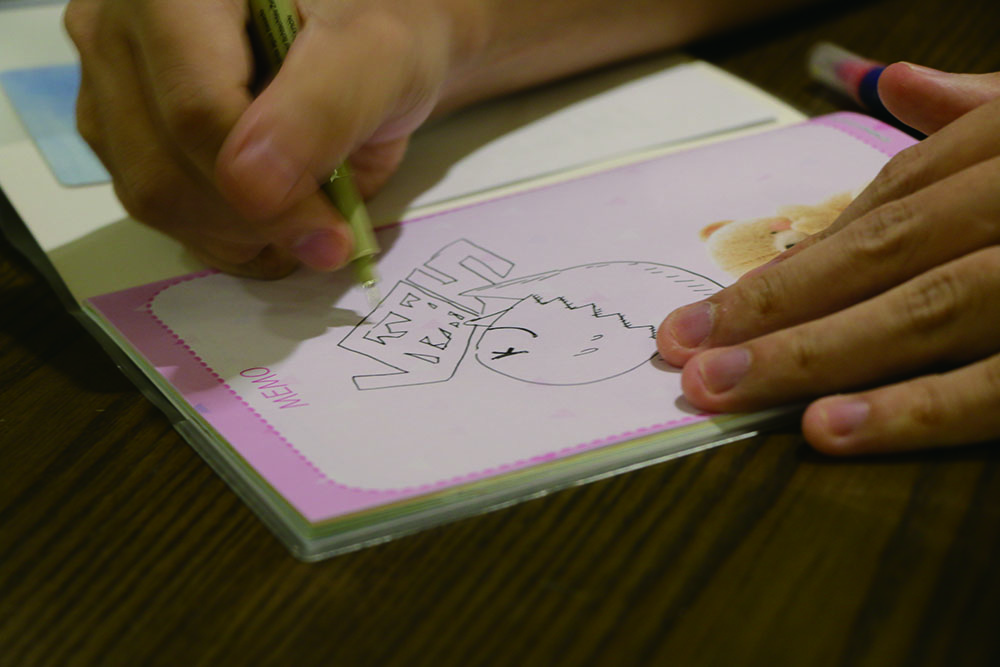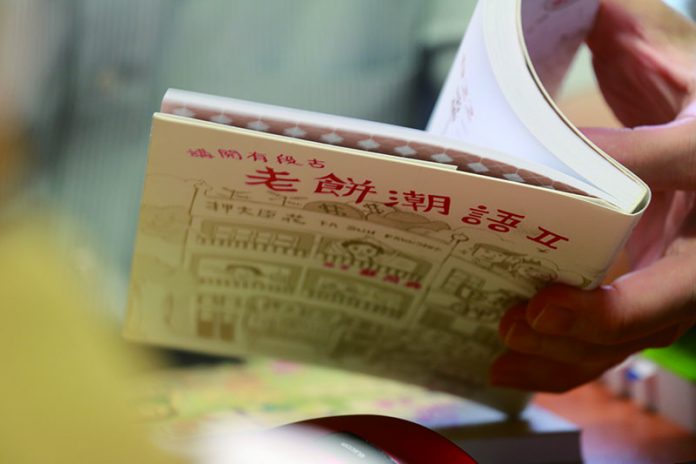Cantonese sayings preserve traditional folk wisdom in a new era
By Fiona Chan
If you were born in a Cantonese family, chances are you have heard the saying: “I have eaten salt more than you have eaten rice (我食鹽多過你食米).” In fact, you have probably been told this by your parents or other senior family members.
It means “I have more experience than you” and is one of the Cantonese sayings, proverbs and idioms commonly used by the past few generations of Hong Kong parents when they scold or advise their children.
These sayings, characterised by allegory and metaphors, are the oral creations of ordinary local people, inspired by their everyday lives and passed on by word of mouth.
Au Yeung Wai-hoo, senior lecturer in the Department of Chinese Language and Literature at the Chinese University of Hong Kong (CUHK), says people in the past often had a limited education but they still wanted to convey folk wisdom and pass it on. They expressed it using simple and brief wording.
Au Yeung gives the example of the idiom, “straw covering pearls” (禾稈冚珍珠), which means pretending to be poor or putting on rags over glad rags. “Say ‘straw covering pearls’ alone and that’s it. The whole picture stands out,” he says. “But if I explain the whole message instead of using the proverb, it is time-consuming and doesn’t have this instructional function.”
Au Yeung points out that Cantonese proverbs and idioms often involve images of specific things that aid memorisation. Therefore, it is sometimes easy to guess what the proverbs mean from the literal meaning. As in the case of “straw covering pearls”, the images of straw and pearls are both easily conjured up. The images also stand in stark contrast with each other – the former is cheap and plentiful, but the latter is precious and rare. This contrast alone makes the saying vivid, its meaning clear without the need for elaboration.
Apart from the characteristics of Cantonese itself, the settings in which the sayings are spoken can encourage people to use them. Tsui Wing-shan, a 25-year-old YouTuber, spends her free time producing Cantonese-themed videos for her “The Wingshantsui Channel”. She says using Cantonese proverbs can help her build relationships with others.
Tsui was born in Vancouver, and grew up there. She says she is lucky to have learned Cantonese at a Chinese language school as a child and she started to love it as a teenager. Tsui says her mother often used Cantonese proverbs in their conversations. Although this gave her the impression that her mum was trying to mock her while giving her advice, she did not resent it. Instead, she found it very interesting.
Tsui thinks Cantonese proverbs and idioms seem more casual than English, which she finds formal and courteous.

“I think compared to English, Cantonese proverbs have a hint of sarcasm. It is not a bad thing but rather can make people closer,” says Tsui.
She began to collect Cantonese proverbs and idioms and introduced them in her videos as a way to save them.
“Producing videos allows permanent preservation. Everybody can view them,” she says.
Although Cantonese proverbs and idioms may seem ubiquitous, there is a chance that some of them are in danger of fading out.
In October, Varsity made a list of eight Cantonese sayings and randomly asked 11 students at The University Mall of CUHK which of the sayings they knew. Most of them knew four or five on the list. One saying that none of the students knew was “Watch the horses fighting from the top of the fort tower” (企喺城樓睇馬打交), which means to keep your distance from or observe from the sidelines. One of the respondents said forts no longer existed and they had not heard of the saying before.
Victor Chung, a 20-year-old student from CUHK is a big fan of Cantonese culture who loves Cantonese proverbs and Cantonese opera. He thinks the decline of Cantonese sayings maybe due to Hongkonger’s increased exposure to foreign cultures and the introduction of more Putonghua teaching in schools.
“We use more English grammar and words such as ‘for’, ‘anyway’ and ‘okay’, leading to the fading of some traditional Cantonese sayings,” says Chung.
However, he is not unhappy about the diminishing use of certain proverbs. Chung says language is constantly changing and people in different times will adopt the usage that is most comfortable for them. As the language evolves, it may absorb elements of other languages and the mixing allows new terms and sayings to emerge. What is a pity, he says, is the lack of preservation of proverbs that give us a window into the past.
Chung is fascinated by Cantonese television drama series set in the 1960s to 1980s, such as 2003’s The Driving Power (非常外父) and 2005’s Scavengers’ Paradise (同撈同煲). These dramas not only include many Cantonese proverbs and vintage slang in the dialogue, but also reflect the social background of the times. “When it [the drama] reflects the appearance of the past, you understand why some sayings are like that,” Chung says. “I won’t say those are terms only used by the older generation or that it’s passé.”
Proverbs from the past give us a glimpse of how people used to live and what their values were. Tang Sze-wing, associate professor of the Department of Chinese Language and Literature at CUHK, explains this by using the example of “[laughed] like a boiled dog’s head (烚熟狗頭)” which is used to describe someone laughing or smiling with a big toothy grin. It is usually meant in a derogatory or sarcastic way. According to Tang, this shows that people used to consume dog meat and dogs were regarded in a relatively negative way.
Once the original environment or social context is lost, it is inevitable that some of the sayings will fade out.
“Certain relevant things or social context have obviously disappeared. Therefore, even if we re-use [the sayings], we have lost that kind of vividness,” says Tang.
For instance, Tang says the idiom, “paring off metal from the nose of a needle” (針鼻削鐵) means to gain the narrowest margin of profit. We can still visualise this proverb – no more steel can be pared from a fine needle – but the saying is no longer used as we seldom use needles or pare metal any more.
Local cartoonist Ah To agrees that it is inevitable and expected that some proverbs will vanish as the relevant social context is lost. Some of them may be replaced with new sayings. For instance, “watch the horses fighting from the top of the fort tower” (企喺城樓睇馬打交) could now be replaced by “eating peanuts while watching movies” (食住花生等睇戲). Ah To thinks such buzzwords from the internet are the proverbs of the new era.
While he accepts it is normal for languages to change and evolve, he cannot accept the erosion of Cantonese for “abnormal” reasons. Ah To lists some of the reasons he sees for the decline of Cantonese – the use of Putonghua to teach Chinese in schools, more Mainlanders coming to Hong Kong and students starting to speak Putonghua in primary school. He has noticed that some people are now extolling other languages and see Cantonese as vulgar or even shameful.

This is why he started creating Cantonese-related illustrations such as The Great Canton and Hong Kong Proverbs containing illustrations of 81 Cantonese proverbs, which was inspired by the Dutch artist Pieter Bruegel’s Netherlandist Proverbs.
Ah To thinks that promoting Cantonese proverbs is one of the many “relatively soft approaches” to conserving and propagating Cantonese. He says Cantonese proverbs are vivid because they utilise metaphors, which make them suitable to visualise through images.
“In this internet era, images always come first. People are lazy about reading words. This makes images a relatively easier channel to propagate proverbs,” he says.
Ironically, Ah To says the greatest repository for Cantonese proverbs may not be found in Hong Kong, or even in Guangdong, but in overseas Chinese communities. He says overseas Chinese react more enthusiastically to his works as they retain their identity by using their mother tongue while living in a foreign environment.
“Language is a vessel for culture,” says Ah To. “So many thoughts and views of Cantonese people have been put into their proverbs and idioms, and these in turn have influenced their values.”
Edited by Karen Yu
| The proverb and its literal meaning | Implication / explanation of the proverb | Number of people who know the meaning |
| 事急馬行田
In a crisis, even a horse will cross a field. |
To be flexible, to adapt to circumstances in an emergency (a reference to the rules of Chinese chess).
|
4 |
| 食鹽多過你食米
I have eaten more salt than you have eaten rice. |
I have more experience than you.
|
11 |
| 倒瀉籮蟹
Spilled a basket of crabs. |
Be all in a muddle; messy
|
6 |
| 和尚擔遮
Monk holding an umbrella
|
無髮無天 “no hair no sky” , which sounds like 無法無天 “no law no heaven”
Means unruly |
7 |
| 有錢使得鬼推磨
Money can make a ghost push a grinder |
Everything is possible with money
|
7 |
| 企喺城樓睇馬打交
Standing on the fort to watch horses fighting |
Keeping oneself out of a matter
|
0 |
| 食拖鞋飯
Eat cooked-rice out of slippers. |
Used to describe a man who is supported by a woman / sponge upon a woman | 5 |
| 冇厴雞籠
A chicken coop without door |
The place where everyone can go in and out as one wishes. | 6 |
From Varsity’s proverb mini test
*Source:
- Guan Jiecai’s “A Dictionary of Cantonese Colloquialisms in English”,
- “The Great Canton and Hong Kong Proverbs” (by Ah To)











































